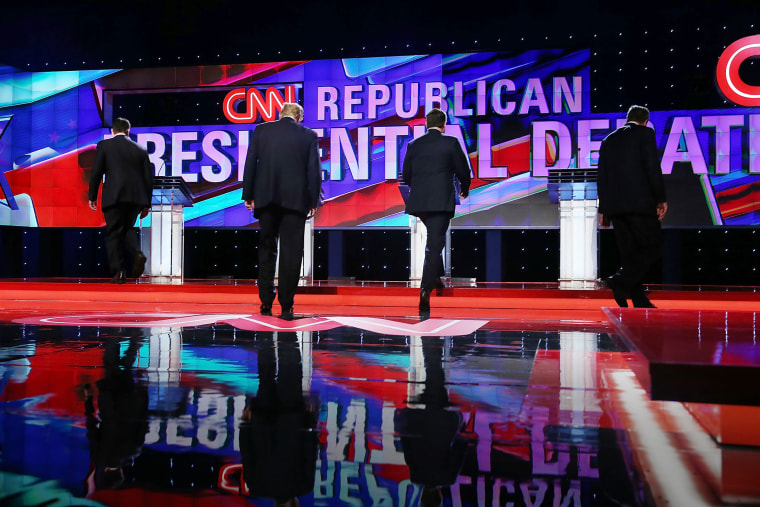Miami, Fla. -- If Donald Trump wins Marco Rubio’s home state and John Kasich’s home state on Tuesday, he’ll take a massive leap towards securing the Republican nomination and likely end both of their campaigns.
You wouldn’t know it from watching Thursday night’s debate, however, where the field seemed content to go gentle into that good night. The debate featured polite disagreements but few outright attacks and a number of substantive exchanges over issues like trade and foreign policy.
If recent polls showing Trump leading Florida and either leading or competitive in Ohio are correct, a quiet debate seems most likely to benefit Trump.
Here were five takeaways from the last GOP debate before the March 15 contests.
Calm before the storm
After a wild pair of debates characterized by continuous battles between Trump and his rivals, the field seemed to decide that the time had come to tone things down.
“I cannot believe how civil it’s been up here,” Trump said during one exchange.
That doesn’t mean there weren’t disagreements. Cruz went after Trump for “funding liberal Democrats” with years of campaign donations. Rubio criticized Trump for saying he would stay “neutral” in Israeli-Palestinian negotiations, which Trump countered by saying he was still “pro-Israel.” Overall, though, it was a cozy affair compared to the recent debates.
What’s less clear is why it was so quiet. Rubio admitted this week that he made a mistake in taunting Trump over the size of his body parts, but he didn’t press his critique on Trump’s “con artist” business record, either. Trump toning it down would make sense if he believes he has a winning hand heading into Tuesday, but that hasn’t stopped him from unleashing the fury in similar situations.
Trump and the violence issue
The mood onstage stood in contrast to the news around Trump recently, which has focused more and more on violence at his events, which Trump sometimes appears to egg on from the podium and in interviews.
The issue has been simmering throughout the race but reached a raging boil this week after a Trump supporter was arrested for sucker-punching a protester and Trump’s campaign manager Corey Lewandowski was accused of violently grabbing Breitbart reporter Michelle Fields after she approached Trump to ask a question.
Trump complained protesters were “swinging” at people at his events, something three full-time Trump reporters said on Twitter that they had not witnessed, although NBC News embed Ali Vitali noted one incident in which a protester tried to bite an attendee.
As for Fields, Trump accused her of fabricating the story despite an eyewitness account from a Washington Post journalist and an audio recording of the incident in which the two reporters recounted what had happened in real time.
“Perhaps she made the story up -- I think that’s what happened,” Trump said after the debate.
In keeping with the friendly nature of the debate, none of Trump’s rivals criticized him over the issue.
Rubio’s dignified debate
If Rubio goes down on Tuesday, he wants to go down with dignity.
Rubio’s tone has shifted through the race. He started the race emphasizing a relatively upbeat message and detailed policy ideas. As the campaign wore on, he began incorporating darker Trumpian language. Finally, he transformed into a bullying anti-Trump insurgent.
For what could be his final debate, Rubio decided to get back to his roots and focused on a more uplifting message with more emphasis on policy. “I believe at the end of this process, the nation will make the right choice, because I’ve always believed that God has blessed this country, that God’s hand is on this country and that its greatest days are yet to come,” he said in his closing remarks.
Rubio connected well with the home crowd, but there was a reason he abandoned his old approach months ago. He has to hope the contrast sways voters better now that there are fewer people onstage.
Delegate math
Trump and Cruz declined to attack the others in the race, but they both made clear that their rivals should consider leaving the race given their significant deficit in the delegate race.
“There's two of us up here that can [win] and there are two of us that cannot at this moment,” Trump said.
“Donald is right,” Cruz said in his answer. “There are only two of us that have a path to winning the nomination, Donald and myself.”
Rubio said he was “going to work tirelessly every single day” out of respect for his supporters but offered no answer as to how he could win without a contested convention.
Kasich said, “Math doesn't tell the whole story in politics.”
Trade war
One of the more interesting policy exchanges was over trade, the rare issue that’s become a significant fight in both party primaries. Earlier this week, Democratic candidate Bernie Sanders won an upset in Michigan in a race where anger over trade deals -- opposed by Sanders -- figured prominently.
Trump took up the mantle on Friday, reiterating his protectionist philosophy and threatening to slap a 45 percent tariff on imported goods from China.
Rubio, by contrast, offered a defense of trade based on conservative free market principles. “We're 5 percent of the world's population,” he said. “If all we do is sell things to each other, we can only sell to 5 percent of the people on earth.”
Cruz, who has shifted his position somewhat towards Trump on trade deals, noted that Trump’s tariffs would significantly raise prices for working Americans. He pledged to try to negotiate better treaties to alleviate the problem while cutting taxes for businesses to make them more competitive.
